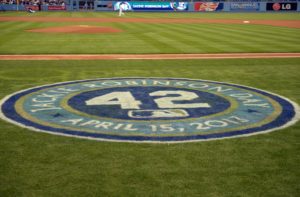
By Doug Smith
Courtesy of the Niagara Gazette
So just how equal were opportunities in Jackie Robinson’s America?
Consider this:
Three years after he broke baseball’s “color barrier,” Hollywood made a movie of his life, so far. Not one black actor was considered appropriate for the role. Robinson played himself, and quite well, with Ruby Dee as Rachel. Running little more than an hour (not uncommon for the time), it was well-received and has stood the test of the decades.
Now, two-thirds of a century after announcer Red Barber needed three martinis before he could socialize with a darker-hued fellow citizen, “42” catches up with Jackie Robinson. The lead role is played by an actor who is barely an asteroid in the vast firmament of stars of color. It opened over the weekend to enormous anticipation. In rural Geneseo, more than 100 people joined us – ethnically, they could have been a major-league baseball roster from 1945.
To coin baseball phraseology, “42” plays within itself, charting just two pioneering years. Chadwick Boseman, slightly shy of Robinson’s remarkable musculature, brings a riveting blend of dignity and frustration. Harrison Ford invests Branch Rickey, Robinson’s singular champion, with a whole Millenium Falconful of piety, practicality and sometimes friendly persuasion. Many took a rain delay to dab at their eyes before filing out.
Director Brian Helgeland actually downplayed the vicious reaction to Robinson. What he and his newlywed Rachel endured went far beyond their ouster from their flight in New Orleans, “to lighten the plane with a storm brewing,” while white travelers, evidently with lighter bones, took their seats.
“We’re not in Pasadena anymore,” Robinson tells Rachel, portrayed with pretty pride by Nicole Beharie.
The film puts up a lot of big innings – Bobby Bragan expressing an epiphany in Rickey’s office, Eddie Stanky challenging the Phillies’ Neanderthal manger, Rickey persuading mild-mannered Burt Shotton to shun retirement and take over the club after Leo Durocher is suspended for conduct out of uniform.
“You Robinson?” asks Shotton, “42’s” Most Valuable Phraser.
Andre Holland plays solidly as the Pittsburgh Courier’s Wendell Smith, Robinson’s biographer, counselor and chauffeur.
Take it from old Rocket Man, “42” looks terrific – rag-doll gloves, punctuated box scores, shabby stands, the look of Ebbets Field, re-created by computer, he hears. Land o’ Goshen, what next?
The movie does not play errorless ball. Nobody said “redneck” then, or “A.S.A.P.,” either, and the Dodgers sure never batted in the top of the 11th at home, and Rickey never swore, though he did beat “Judas Priest!” into the ground.
But score a hit to Director Helgeland for scriptural purity, no manufactured crises. When Robinson first scores there’s no close play at the plate, and the Dodgers win the pennant by double figures. It’s not as mean as it could be but it’s never wrong, unlike the fan in Sanford, FL (of all places) telling Robinson “The Brooklyn Dodgers ain’t changin’ our way of life.”
Say what?
NINE ROCKETS (out of 10).
Reach Rocket Man via pollyndoug@hotmail.com.

Am a fan of advanced stats but a neophyte at that. Just not sure WAR can measure Jackie Robinson’s impact. Enjoyed the movie. Hans Solo sure has grown up
Did not realize the role of Wendell Smith until seeing the movie. Branch Rickey’s foresight has few rivals. The guy is credited for creating the farm system. He initiated the integration of the game, and he knew enough to hire a writer to follow Jackie Robinson.